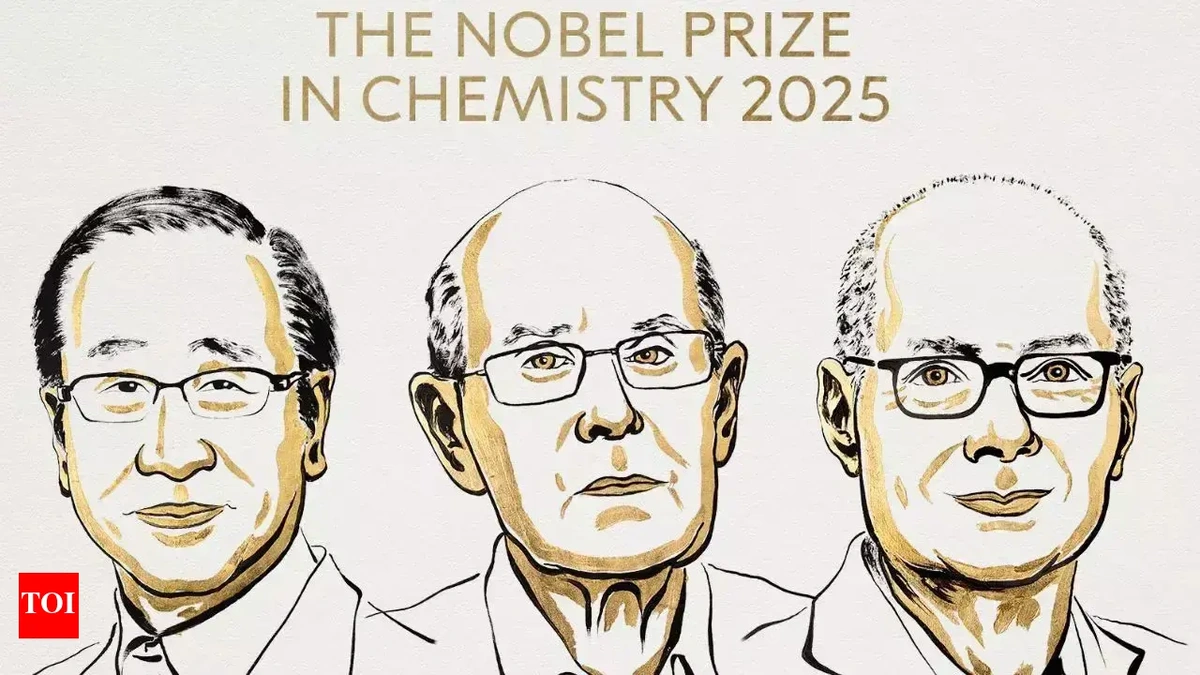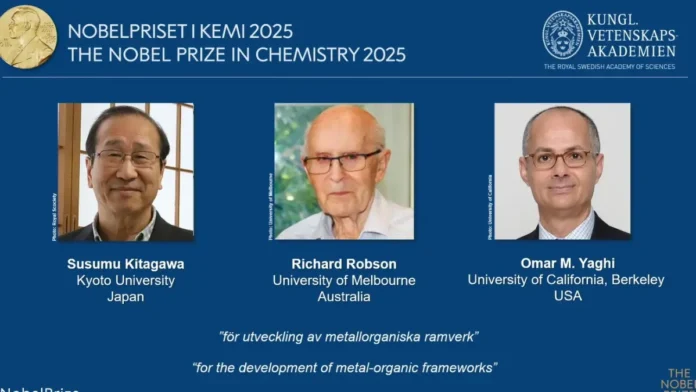Okay, folks, let’s talk about something truly fascinating: the Nobel Prize in Chemistry . But not just the “who won” part – let’s dive into why this matters, especially to us here in India. This year, the prestigious award went to three brilliant minds: Kitagawa, Robson, and Yaghi. Sounds straightforward, right? But, trust me, the implications of their work are HUGE.
What Exactly Did They Do? The “Why” Angle

So, what was so special about their contributions that it warranted a Nobel Prize ? It boils down to something called metal-organic frameworks (MOFs) . Now, I know that sounds like something out of a sci-fi movie, but stick with me. MOFs are essentially tiny, porous structures – think of them as microscopic sponges – that can trap gases and other molecules.Wikipedia explains it pretty well. Kitagawa, Robson, and Yaghi are considered pioneers in this field.
But why is trapping gases important? That’s the million-dollar question (or, in this case, the Nobel Prize-winning question). See, these MOFs have a multitude of applications, and that’s where the excitement truly lies. Think about it: capturing carbon dioxide from the atmosphere to combat climate change. Storing hydrogen safely for fuel cells in vehicles. Separating valuable gases in industrial processes. The possibilities are endless. What fascinates me is how such a seemingly simple concept – a tiny, porous structure – can have such a profound impact on the world.
Why This Matters to India
Here’s the thing: India faces some pretty significant challenges when it comes to pollution and energy. We’re a rapidly developing nation, and with that comes an increased demand for resources and a growing environmental footprint. That’s where MOFs come in. Imagine using MOFs to clean up industrial emissions in our cities, or to develop cleaner and more efficient energy sources. It’s not just a theoretical possibility – it’s a very real and achievable goal.
And it’s not just about environmental benefits. India has a massive talent pool of scientists and researchers. The recognition of MOFs through the Nobel Prize in Chemistry could inspire a new generation of Indian scientists to pursue research in this cutting-edge field. We have the potential to become a global leader in MOF technology.
Potential Applications and Future Implications
Let’s talk specifics. One of the most promising applications of MOFs is in carbon capture . India is heavily reliant on coal-fired power plants, which are a major source of carbon dioxide emissions. MOFs could be used to capture CO2 from these power plants, preventing it from entering the atmosphere and contributing to global warming. Another area where MOFs could make a big difference is in water purification . Many parts of India face water scarcity and contamination issues. MOFs can be designed to selectively remove pollutants from water, providing access to clean and safe drinking water. The development of zeolite materials is of vital importance.
And it’s not just about addressing existing problems. MOFs also have the potential to revolutionize industries. They can be used to develop new catalysts for chemical reactions, leading to more efficient and sustainable manufacturing processes. They can also be used in sensors to detect pollutants and other harmful substances. I initially thought this was a niche area of research, but then I realized the sheer scale of its potential impact. Let me rephrase that for clarity – MOFs are not just about chemistry, they’re about solving some of the world’s most pressing challenges.
The Indian Perspective on this achievement in Chemical Science
The work of Kitagawa, Robson, and Yaghi isn’t just a win for science; it’s a win for humanity. And it’s especially relevant to India, given our unique challenges and opportunities. We have the resources, the talent, and the need to embrace this technology and become a leader in its development and application. This is where the importance of MOFs really shines through.
The announcement of the award could act as a catalyst for increased funding and collaboration in this field. Imagine the possibilities if Indian universities and research institutions were to partner with leading international experts in MOF technology. We could accelerate the development of new and innovative solutions to our most pressing problems.
A common mistake I see people make is thinking that scientific breakthroughs are only relevant to scientists. But the truth is, science affects all of us. It shapes our lives, our economies, and our future. The work of Kitagawa, Robson, and Yaghi is a testament to the power of scientific innovation to transform the world for the better. The blood moon phenomenon has also captured public imagination, demonstrating the widespread interest in scientific discoveries. Learn more about it here: blood moon .
But, and this is a big but, the official confirmation on how quickly this technology can be deployed in India is still pending. It’s best to keep checking with experts and the official science portals.
A Call to Action
So, what can you do? Well, for starters, you can spread the word! Share this article with your friends, your family, and your colleagues. Let them know about the incredible potential of MOFs and the importance of supporting scientific research in India. Let’s connect this with the latest launch updates : Vandenberg launch . And if you’re a student or a researcher, consider pursuing a career in this field. We need bright minds like yours to help us unlock the full potential of MOFs and create a better future for India. What fascinates me most is the scope of this research.
FAQ
Frequently Asked Questions
What exactly are metal-organic frameworks (MOFs)?
MOFs are tiny, porous materials that can trap gases and other molecules.
Why are MOFs important?
They have a wide range of applications, including carbon capture, gas storage, and water purification.
How can MOFs benefit India?
They can help address pollution, energy, and water scarcity challenges.
What is carbon capture?
It’s the process of capturing carbon dioxide from the atmosphere or industrial sources.
Are MOFs currently being used in India?
Research and development efforts are underway, but widespread deployment is still in the future.
How can I learn more about MOFs?
Search for “metal-organic frameworks” on reputable scientific websites and journals.




